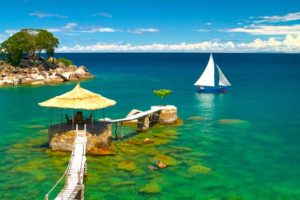The last three months I have been overwhelmed, both professionally and personally. My work and personal lives were like two tall waves, simultaneously breaking over my head, temporarily drowning me. For three months I have been unable to breathe. The waters now dissipate, and I am surfacing.
My professional life has not been a wave but a tsunami. The DON clinical trial is hurtling towards beginning to enroll patients. I was warned that, for a Principal Investigator, this period in a clinical trial is the most challenging. Every day and I feel like I am struggling, pushing things to happen that were not meant to happen, and constantly sounding to my coworkers like a demanding demon.
We ordered two medical grade freezers from South Africa in which to store the drug. Finally, after they were paid for, instead of being put on a truck and brought to Blantyre (which takes three days) someone put them on a plane to Nairobi. There they sat for a week. Then, unannounced, someone put them on a plane to Lilongwe, the capital city which is five hours away. There they sat for three weeks, awaiting road transport to Blantyre. First the truck was too full. Then there was no truck with enough space. Finally, I had to explain that these freezers were paid by US government funds and that I would have to report the shipper to the US government. The next day, the freezers were on their way to Blantyre. I had to email and call every day for 6 weeks to make this happen. My co-worker, Meredith Sherman, did the same.
Once the freezers were in place, we had to get the drug to Malawi. This took a series of approvals from the Malawi Pharmacy and Medicines Regulatory Authority (PMRA), similar to the US Food and Drug Administration (FDA). I submitted over a thousand pages of documents to PMRA before approval came through. Twenty-four vials of the drug were shipped on 750 pounds of dry ice. This is not a misprint. Seven-hundred and fifty pounds. The drug was shipped from Iowa (where it was manufactured) to Newark, where it sat for over a week. Then, unexpectedly, it was flown to Johannesburg, where it sat for over a week. It was not scheduled to ever be shipped to Malawi. The African subsidiary of the shipping company was fighting with the American subsidiary and no one would deliver the drug to Malawi. My NIH colleague, Brittany Riggle, and I called and emailed and begged and pleaded that the drug be delivered before the dry ice melted and the medication ruined. Then, magically and with two hours warning, it arrived into Blantyre airport. On a Sunday. Everything in Malawi is closed on Sundays.
The United States Food and Drug Administration (FDA) also had to approve the DON clinical trial. The application to list DON as an investigational new drug took three years to complete. It was thousands of pages. We thought the FDA would let us start in January 2022. Then March. Then May. Then June. Then July. Each time there was a delay I had to get the Malawi team ready to start and then announce to them the clinical trial was not yet happening. Though Brittany Riggle (of DON shipping fame, above) led the way (and did 99.9% of the work and succeeded in getting the clinical trial approved by the FDA), the repeated getting the Malawi team ready and not starting has been wearing.
I have been slowly drowning.
During all of this, I had four enthusiastic students come to Malawi to perform a clinical research project. Three of the students were undergraduates and the last had recently finished his first year of medical school. When I signed them up, I knew it would be challenging, as they would know little to nothing about research. What I (stupidly) did not anticipate is they also knew nothing about medicine. Clinical medicine has a lot of unique vocabulary. Unless I taught this vocabulary to them rapidly, they were not going to understand anything that was being said in the hospital. The first 2 weeks of their seven-week visit was exhausting for us all. I was trying to quickly cram vocabulary and medical knowledge into their brains. And they were just as quickly trying to absorb it all. And deal with the difficulties of never having been in a hospital before, much less one in a country with very limited resources. By the end of their stay, I think the students’ experience was a good one, but it was a lot of work for us all.
And on a personal front? Finally, after just under 3 months of this, I returned to the USA to celebrate my mother’s 90th birthday. Jones and I flew back to Washington DC for an American break. Twelve hours after arriving into our apartment, we departed again for Cincinnati, where my mother and the rest of my family lives. My sister had planned a full day of activities to celebrate this important milestone. I went to my mother’s residence to pick her up for the Big Day. She was coughing. A lot. Her COVID rapid test was positive. Party cancelled. The following day, Jones and I flew back to Washington DC, packed up our luggage for a longer visit, and returned to Ohio the following day. My sister takes excellent care of my mother but needed a break and was scheduled to vacation in Mexico. My sister and family left for vacation. Jones and I picked my mother up and cared for her for 6 days until she recovered. We returned to Washington DC last week and had two days before leaving again, me to Malawi and Jones to Brazil. Our 2.5 week trip to our home in the USA turned into 3 days.
My dog died. My mother’s best friend died. A close family member has cancer. Over the last 3 weeks I flew 18,000 miles (30,000 kilometers) and had bad jet lag going both east to west, and west to east. Malawi resumed aggressive “load shedding” where the electricity company shuts off power 8-14 hours every day. Gasoline in Malawi is now $8 per gallon. The prices in the grocery store doubled overnight. Rumors are flying that we will soon have another devaluation of the Malawian kwacha. I have been slowly drowning.
Two weeks ago, I thought that I could restart writing this blog. I sat down with the intention to begin again. I put down two sentences and stopped. It was not time.
And now it is.






